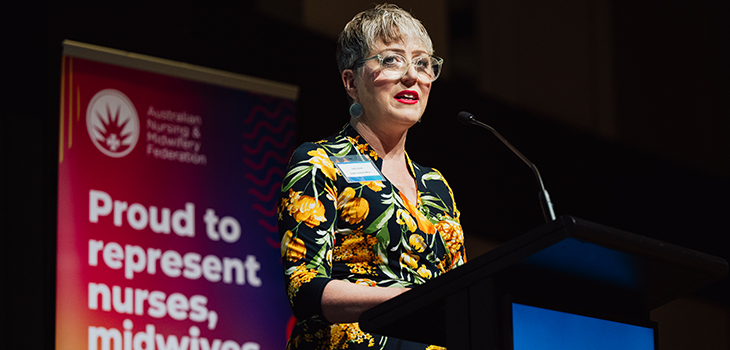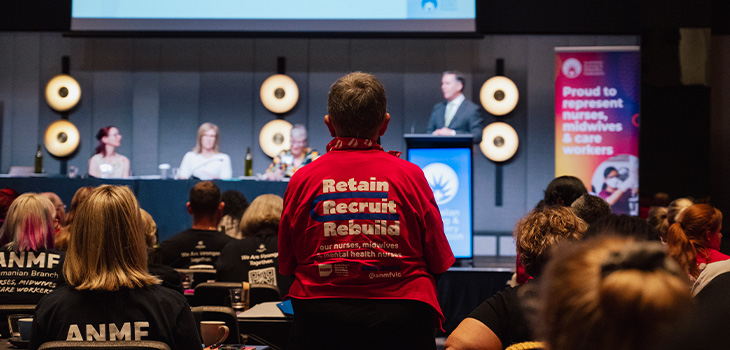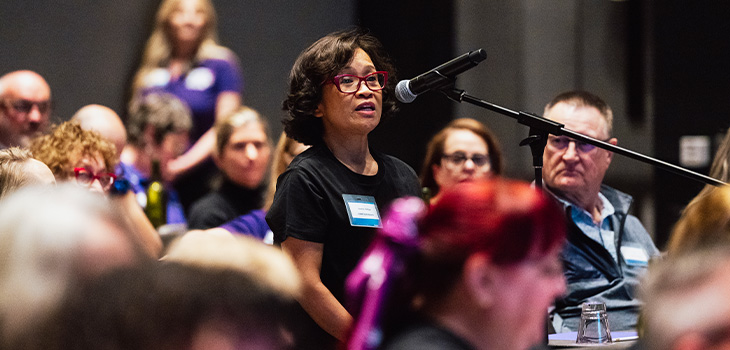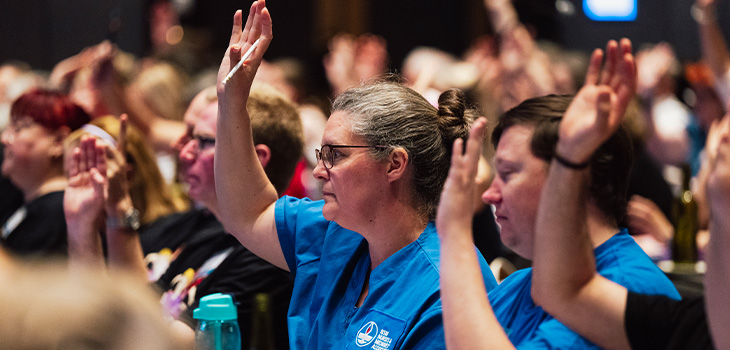Productivity has been a major topic of discussion in recent months after the federal government declared it a national priority. The Australian Nursing and Midwifery Federation’s (ANMF) 17th Biennial Conference – Productivity with purpose: Empowering nurses, midwives and care workers – tapped into this agenda, with more than a hundred delegates from across the country last week gathering on the Gold Coast to help shape the ANMF’s focus and action for the next two years.
Opening the conference, ANMF Federal President Sally-Anne Jones said the term productivity was challenging for the professions because human-centred work isn’t easily measured.
“Service roles like ours involve emotional labour, critical thinking and interpersonal care,” she told delegates.
“These elements are difficult to capture in metrics like throughput or time for task. When productivity is framed very narrowly, it can add pressures to do more with less.”

As productivity pressures inevitably grow, Ms Jones urged the professions to be clear about their role in the healthcare system, continue to fight for its understanding, and use the power and influence of belonging to the largest union in the country, to safeguard the health of Australians now and into the future.
“We will win good jobs. We will secure employment for all nurses and midwives by continuing to work together and we’ll build communities that are well and are safe.”
In her report, ANMF Federal Secretary Annie Butler outlined numerous gains achieved over the past few years, including registered nurses 24/7 in nursing homes, aged care pay rises and financial support for students during clinical placement. But more needs to be done, she stressed.
“All of the motions that you’ve put forward, if they were invested in, they wouldn’t only help empower nurses, midwives and care workers, they would also actually increase productivity. This is why we need to talk about productivity.”
Speaking at the conference, Minister for Health, Disability and Ageing, Mark Butler, too, referenced the current productivity debate, noting that traditional measures of productivity may work really well for something like widget making but not so much for healthcare.
“It’s so important that health leaders are active participants in this debate on productivity. We cannot let that debate just be a traditional labour productivity measurement. We’ve got to get quality onto the agenda as well.”
Mr Butler told delegates he was particularly focused on pursuing two areas involving productivity in healthcare – digitisation, and “how we use our workforce”.
“It just does not make sense not to have every single healthcare professional in the system working to the top of their skills and experience and training,” he said.

Motions/Resolutions
Throughout the conference, delegates put forward and debated over 40 motions across areas including Workforce, Aged Care, Increasing Equity in Access to Healthcare, Industrial and Social Justice and Sustainability. All resolutions are subject to final endorsement by the ANMF’s Federal Executive.
Motions included:
- That the Federal ANMF actively lobby for legislation to protect nurses and midwives from unacceptably high levels of workplace/occupational violence
- The Federal ANMF actively pursue a campaign aimed to end financial hardship and placement poverty faced by students caused by mandatory unpaid placements
- That the ANMF calls on the federal government to mandate national minimum staffing levels across all healthcare settings
- That the Federal ANMF lobby for compliance of direct care minutes in residential aged care
- A comprehensive national registration scheme for all aged care workers
- Lobby the federal government to mandate specific Enrolled Nurse minutes in nursing homes
- ANMF advocates for the federal government to develop an EN 24/7 requirement
- That the ANMF Federal Office coordinates a National Nurses and Midwives Day of Action to demand federal and state governments prioritise healthcare budgets over discretionary spending such as fossil fuel subsidies
- That the Federal ANMF, with the ACTU, investigates the possibility of a 32-hour/4 days per week for all nurses and midwives
- That the Federal ANMF lobby the federal government to change the provisions in the Fair Work Act 2009 that prohibit nurses and midwives working at privately owned facilities from taking industrial action outside of the enterprise bargaining period
- Lobby the federal government to make all transport for nurses and midwives tax deductable to attend work whether it be public transport or vehicle carparking costs
Aged care
As with previous Biennial conferences, aged care reform was a central focus of motions.
NSWNMA aged care RN Jocelyn Hofman moved a motion to enshrine care minutes in appropriate legislation such as the Aged Care Act and Modern Awards, to ensure proper compliance.

“Providers are not taking us seriously,” she said.
“They’re manipulating the data and that manipulation is concerning because our residents may not be receiving the care that they need and taxpayers are funding that care and it’s not being delivered.”
Meanwhile, fellow NSWNMA member Diane Lang moved a motion that the ANMF seek an urgent meeting with Aged Care Minister Sam Rae to discuss several issues, including some providers not passing on the full wage increase won from the ANMF’s Work Value Case.
“We want to make sure that there’s accountability in the money that’s given to the aged care providers to deliver those wage increases. They’re not giving it. To me, that’s wage theft.”
ANMF Federal Secretary Annie Butler told delegates that while positive reforms had occurred in the sector, more needs to be done. Importantly, she officially announced the launch of a comprehensive national review of the aged care system to assess the effectiveness of the Aged Care Royal Commission’s recommendations.
Workforce productivity
Addressing delegates (virtually) from Scotland, Professor James Buchan, Adjunct Professor WHO Collaborating Centre, School of Nursing, UTS, also explored the productivity discussion, citing several recent reports he believes can help nursing and midwifery organisations “frame their own narrative” when they engage in the debate.
His starting advice for nursing and midwifery organisations is to embrace the complexity that comes from a proper look at what productivity means, while not losing sight of the human angle.
Key messages from recent reports include the return on investment in health, the link between the creation of decent jobs and economic output, the economic power of care, and the value of nursing and its contribution to health, social and economic benefits, he said.
“Emphasise the positive when you’re getting into this dialogue and debate the contribution, the impact, the value versus the benefit, the outcomes, the scope of significant multipliers and returns on investment,” Professor Buchan encouraged.
Building power
Closing the conference, ANMF Federal Vice-President Sally-Anne Jones called on delegates to continue to fight to be heard.
“We are compelled to continuously present the value proposition,” she said,
“We are more than care. Nurses delivering nursing. Midwives delivering midwifery. Aged care and disability workers deliver specialised care work. Knowledge, skills, critical thinking, safety, advocacy, presence. It’s so much more than just care.”








